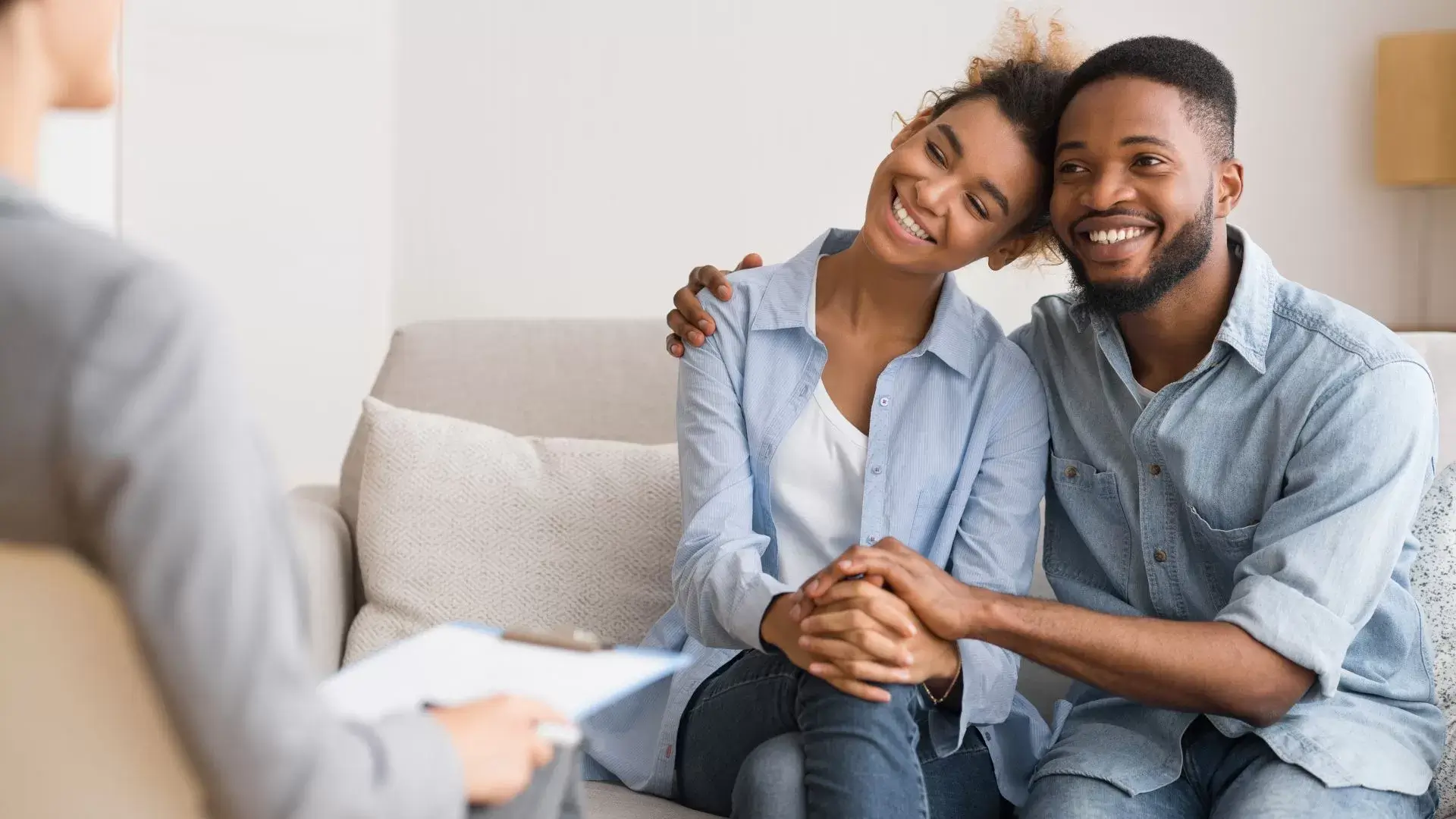Marriage Counseling Psychotherapy
We acknowledge that many couples encounter challenges that can strain their relationship, and that’s where marriage counseling psychotherapy comes in. It provides a safe space for us to communicate openly, address conflicts, and rebuild trust. Through tailored guidance, we gain essential skills for emotional resilience and conflict resolution. This process not only enhances our connection but also fosters deeper intimacy. By recognizing our emotional vulnerabilities and developing healthier communication patterns, we support each other in growing together. If we explore further, we can uncover how this transformative journey can truly enrich our lives and strengthen our bond.

About Our Psychotherapy Counseling Services
At Psychotherapy Counsellor Center, we acknowledge that maneuvering through the complexities of marriage can be challenging, and we’re here to offer compassionate support through our specialized psychotherapy services. Our marriage counseling and relationship counseling aim to help couples navigate their unique challenges and foster a deeper emotional connection.
In our sessions, we focus on essential skills such as conflict resolution and communication skills, which are crucial for any thriving partnership. We recognize that rebuilding trust can be a difficult process, but through our tailored marital therapy, we provide the tools and strategies necessary for relationship improvement.
We prioritize creating a safe environment where partners can express their feelings and concerns openly. Our therapy for partners not only addresses issues but also emphasizes emotional support, helping couples reconnect and rediscover their love for one another. By engaging in this journey together, we believe that couples can cultivate resilience and a stronger foundation for their relationship.
With our dedicated team, we’re committed to guiding you towards a healthier, happier marriage, where understanding and connection flourish. Let’s begin this transformative journey together.
Understanding Marriage Counseling Psychotherapy
Understanding marriage counseling psychotherapy involves recognizing how it serves as an essential resource for couples seeking to strengthen their bond and resolve conflicts in a supportive environment. Through couples therapy, we can explore the intricate relationship dynamics that often lead to misunderstandings and emotional distance.
One of the marriage counseling benefits we experience is the ability to enhance our marital communication, which fosters emotional intimacy. By addressing trust issues, we can build a foundation of safety and openness that is crucial for relationship recovery.
In therapy, we learn effective conflict resolution strategies tailored to our unique needs, helping us navigate disagreements without damaging our connection. Establishing clear marriage therapy goals enables us to focus on our emotional well-being, ensuring we prioritize our relationship amidst life’s challenges.
Ultimately, understanding marriage counseling psychotherapy equips us with tools to create a healthier partnership. By engaging in this process, we not only work through our current issues but also cultivate skills that promote long-lasting harmony and fulfillment in our marriage. Together, we can transform our relationship into a source of strength and happiness.
The Importance of Couples Therapy in Modern Relationships
Couples therapy plays an essential role in helping us navigate the complexities of modern relationships, providing a safe space to address our challenges and deepen our connection. In today’s fast-paced world, we often encounter communication breakdowns that can lead to misunderstandings and conflict. Relationship counseling services guide us in learning effective conflict resolution techniques, allowing us to handle disagreements constructively.
During marriage therapy sessions, we explore underlying issues that may affect our emotional health and overall relationship satisfaction. These sessions equip us with relationship tools that foster emotional resilience, helping us bounce back from difficulties more effectively. Whether it’s working through the aftermath of infidelity or enhancing our bond through relationship strengthening exercises, couples therapy offers invaluable support.
Moreover, it teaches us how to prioritize our emotional well-being and nurture our relationship, ensuring we grow together rather than apart. By investing in marriage conflict resolution strategies, we’re not just addressing immediate concerns; we’re laying a foundation for a healthier, more fulfilling partnership. Ultimately, couples therapy empowers us to transform our relationship dynamics, leading to greater intimacy and understanding.
Common Relationship Issues Addressed in Marriage Counseling
Steering through the complexities of relationships often brings to light common issues that marriage counseling is specifically designed to address. Many couples find themselves grappling with relationship issues such as communication breakdowns, which can lead to significant marriage conflict. We recognize that effective couple communication is essential for resolving emotional connection issues and fostering relationship trust.
In our journey together, we can explore intimacy building, which often suffers amidst daily stresses and misunderstandings. It’s important to cultivate emotional vulnerability with one another, allowing us to share our feelings without fear. This openness can lead to greater marital growth and deeper connections.
Additionally, we may confront challenges in conflict management, where problem-solving skills become critical. By learning to address disagreements constructively, we can turn potential rifts into opportunities for growth.
Ultimately, marriage counseling offers a supportive environment for steering through these common issues, enabling us to strengthen our bond and enhance our relationship. Together, we can work through these hurdles, gaining insights and tools that will empower us to create a healthier, more fulfilling partnership.

Conflict Resolution Strategies for Couples
Maneuvering conflict in a relationship can be challenging, but we can adopt effective strategies that foster constructive dialogue and strengthen our bond. One key approach is conflict prevention; by anticipating potential issues, we can navigate relationship challenges before they escalate. We should also recognize communication barriers that may arise, ensuring we’re both on the same page.
Understanding our couple dynamics is essential. We need to manage expectations, acknowledging that we both have different perspectives and feelings. This understanding allows us to create emotional balance, fostering a safe space for open dialogue. When marital conflict arises, we can utilize relationship advice that encourages us to focus on solutions rather than blame.
Engaging in active listening can promote relationship healing, as it shows we value each other’s thoughts. Additionally, practicing patience during disagreements can enable us to approach marriage problem-solving together, rather than as adversaries. By employing these strategies, we can transform conflicts into opportunities for growth, ultimately strengthening our partnership. Let’s commit to nurturing our relationship through these conflict resolution strategies, creating a more resilient and loving connection.
Enhancing Communication Skills Through Marital Therapy
Effective communication is often at the heart of marital therapy, helping us bridge gaps and foster deeper connections in our relationship. Through pre-marital counseling and relationship coaching, we can learn to express our thoughts and feelings more openly, ultimately leading to improved communication enhancement. This process allows us to address partnership issues that may be causing strain, enabling us to manage relationship stress more effectively.
As we develop these skills, we find that our marital satisfaction increases. We gain tools to articulate our needs and desires, fostering healthier relationships with one another. Additionally, by focusing on shared goals, we cultivate emotional growth as individuals and as a couple.
In therapy, we’re encouraged to practice active listening, which not only validates our partner’s feelings but also paves the way for constructive dialogue. This skill is essential in maneuvering conflicts and preventing misunderstandings. As we enhance our communication, we also lay the groundwork for rebuilding intimacy. By prioritizing open conversations, we create a safe space where both partners can thrive, ultimately nurturing a loving and resilient partnership that withstands challenges.
Rebuilding Intimacy and Emotional Connection
Rebuilding intimacy and emotional connection in our relationship requires us to prioritize vulnerability and trust, creating a safe environment where both partners can freely express their innermost feelings and desires. We need to recognize that strengthening relationships often involves addressing underlying relationship patterns that may have contributed to our current challenges.
By engaging in open dialogues, we’re not just sharing thoughts; we’re allowing ourselves to be seen and understood. This is vital for emotional connection, especially as we navigate couple’s challenges together. Marriage guidance can help us explore these dynamics, especially when facing commitment issues that may arise from past experiences.
It’s essential to embrace the process of relationship rebuilding, acknowledging that it takes time and effort. Through this, we can foster long-term relationships that flourish with love and respect. Additionally, incorporating activities that promote marriage enrichment can reignite our passion and strengthen our bond.
As we continue this journey, let’s remain committed to each other, understanding that the road may be bumpy, but the rewards of a deeper emotional connection and restored intimacy are well worth it. Together, we can create a loving, supportive partnership that thrives.
Trust Rebuilding and Infidelity Recovery
As we work on strengthening our emotional connection, it’s important to acknowledge that trust can be deeply shaken by infidelity, making the journey of recovery both essential and challenging. We often find ourselves maneuvering through intense relationship stress, which can feel overwhelming. Through psychotherapy counseling services, we can explore our individual love languages and how these impact our relationship compatibility.
At Psychotherapy Counsellors, we can access specialized support tailored for our needs. We can schedule sessions that focus on trust rebuilding. Engaging in family therapy can also be beneficial, especially for those of us in blended families facing couple’s challenges.
Addressing the emotional scars left by betrayal requires patience and open communication. We must be willing to listen and express our feelings honestly. This process allows us to rebuild trust, creating a safer space for vulnerability. As we work through our pain together, we can learn valuable skills to strengthen our bond, ultimately paving the way for a healthier, more resilient relationship. Remember, healing is possible when we commit to the journey together.
Pre-Marital Counseling for a Stronger Future
Steering the journey toward marriage can be both exciting and intimidating, making pre-marital counseling an invaluable resource for couples enthusiastic to build a strong foundation for their future together. This type of counseling offers us a safe space to explore our values, beliefs, and expectations about marriage. We can openly discuss our individual backgrounds, communication styles, and financial priorities, ensuring we’re on the same page before taking this significant step.
Through guided discussions, we can identify potential challenges and develop strategies to navigate them together. By recognizing our differences and learning how to compromise, we strengthen our bond and trust in each other. Pre-marital counseling allows us to practice essential skills like active listening and conflict resolution, which are vital for maintaining a healthy relationship.
Additionally, we can set shared goals that align with our vision for the future. This process not only prepares us for the realities of married life but also deepens our emotional connection. Ultimately, engaging in pre-marital counseling can empower us to cultivate a partnership built on mutual respect, understanding, and love, paving the way for a fulfilling future together.
Addressing Relationship Dynamics and Patterns
Identifying and understanding the dynamics and patterns within our relationship can reveal important insights that help us navigate our journey together more effectively. We often find ourselves falling into repetitive cycles that can be hard to break. By recognizing these patterns, we can begin to see how our behaviors and reactions influence our connection.
Let’s take the time to reflect on how we communicate. Are we open and honest, or do we sometimes hold back out of fear? It’s essential to acknowledge our individual triggers and how they may impact our interactions. When we’re aware of these dynamics, we can create a safe space for open dialogue.
Exploring our past experiences can also shed light on our current patterns. We might discover that unresolved issues from previous relationships are affecting how we relate to one another. By addressing these historical influences, we can start to shift our responses and grow together.
Ultimately, understanding our relationship dynamics is about fostering mutual respect and empathy. As we bring these insights into our counseling sessions, we can build a healthier foundation for our partnership, allowing us to thrive both individually and as a couple.

Managing Relationship Stress and Conflict Prevention
Managing stress and preventing conflict in our relationship requires us to actively cultivate awareness of our emotional triggers and develop strategies to address them before they escalate. It’s essential we acknowledge that stressors can arise from both external pressures and internal dynamics. By recognizing these triggers together, we can create a supportive environment where we feel safe to express our feelings.
One effective strategy we can adopt is to practice open communication. Setting aside time to check in with each other allows us to share our concerns and feelings without judgment. This fosters understanding and reduces the likelihood of misunderstandings. Additionally, we should learn to identify when we’re feeling overwhelmed. Taking a step back during heated moments can help us cool down and reflect.
Another useful approach is to establish healthy boundaries. By discussing our limits and expectations, we’re less likely to feel resentful or taken for granted. Finally, regular stress-relief activities—like exercise, mindfulness, or simply enjoying time together—can greatly bolster our resilience. By prioritizing these practices, we equip ourselves to navigate challenges and strengthen our bond. Together, we can create a harmonious relationship where stress and conflict are managed effectively.
Strengthening Relationships Through Love Languages
Understanding and embracing each other’s love languages can transform the way we connect and communicate in our relationship. By recognizing how we each express and receive love, we can strengthen our bond and deepen our understanding of one another. Love languages—words of affirmation, acts of service, receiving gifts, quality time, and physical touch—aren’t just concepts; they’re essential tools for traversing our emotional landscape together.
When we take the time to identify our own love languages, as well as those of our partner, we create a roadmap for intimacy. For instance, if our partner thrives on words of affirmation, we’ll want to express our love through compliments and encouragement. Conversely, if we flourish with acts of service, we can show our affection by helping out with chores or running errands.
It’s important to communicate openly about these preferences, fostering a safe space for vulnerability. When we actively demonstrate understanding and appreciation for each other’s love languages, we’re not just enhancing our emotional connection; we’re also building a resilient foundation for our relationship. Ultimately, this shared language of love can lead to greater harmony and fulfillment in our lives together.
Overcoming Emotional Vulnerability and Building Resilience
Emotional vulnerability can feel intimidating, yet embracing it is essential for building resilience and fostering deeper connections in our relationships. We often shy away from expressing our emotions, fearing judgment or rejection. However, when we allow ourselves to be vulnerable, we open the door to authenticity and trust. This honesty lays the foundation for stronger bonds with our partners.
To overcome our fears, we can start by creating a safe space for open communication. Let’s encourage each other to share our thoughts and feelings without the worry of backlash. Practicing active listening is vital; when we genuinely listen, we validate our partner’s experiences, making them feel seen and heard.
Building resilience takes time and patience. Instead of viewing vulnerability as a weakness, we can reframe it as a strength that enables us to learn and grow from our experiences. We should acknowledge our emotions, both the highs and the lows, and understand that it’s okay to ask for support when needed. By doing this together, we cultivate a deeper understanding of one another, which ultimately enhances our emotional intimacy and strengthens our partnership.
Family Therapy and Blended Family Counseling
Steering through the complexities of family dynamics, especially in blended families, often requires specialized support to foster harmony and connection among all members. We recognize that blending families involves unique challenges, such as maneuvering loyalties, establishing new roles, and addressing differing parenting styles. It’s essential that we create a safe space where everyone feels heard and valued.
Engaging in family therapy allows us to explore these dynamics openly. We can help each family member express their feelings, fostering empathy and understanding. Through structured sessions, we can identify patterns that may be causing tension and work collaboratively to find solutions.
In blended family counseling, we also emphasize the importance of building trust. By encouraging open communication, we can help family members articulate their needs and boundaries, paving the way for deeper connections.
Ultimately, our goal is to create a cohesive family unit where each person feels respected and integrated. Together, we can develop strategies that honor everyone’s individual experiences while cultivating a shared family identity, leading to a more harmonious and supportive environment for all.
Marriage Counseling Benefits for Long-Term Relationships
Exploring marriage counseling can greatly enhance the strength and resilience of long-term relationships, providing couples with essential tools to navigate challenges together. When we engage in counseling, we gain insights into our communication patterns, helping us articulate our feelings and needs more effectively. This fosters understanding and connection, vital elements for any enduring partnership.
Moreover, marriage counseling offers a safe space where we can address unresolved issues without fear of judgment. It encourages us to confront difficult topics that might otherwise remain buried, allowing for healing and growth. By working with a professional, we’re guided to develop healthier coping strategies, which can greatly reduce conflict and stress in our relationship.
Another benefit is the reinforcement of shared goals. Counseling helps us align our visions for the future, ensuring we’re working together towards common aspirations. By fostering teamwork and collaboration, we cultivate a deeper bond that can withstand life’s ups and downs.
Ultimately, marriage counseling isn’t just for crisis management; it’s a proactive approach that enriches our relationship, helping us build a solid foundation for lasting love and companionship. Together, we can transform challenges into opportunities for growth and connection.
Reach Out for Professional Marriage Counseling Services
Recognizing the need for professional marriage counseling services can be a pivotal step toward nurturing our relationship and fostering deeper understanding between us. It’s not always easy to admit we need help, but reaching out is a sign of strength, not weakness. By engaging a qualified counselor, we can create a safe space to explore our feelings and communicate more effectively.
When we choose to seek professional guidance, we’re opening ourselves to new perspectives and tools that can enhance our relationship. A trained therapist can provide us with valuable strategies to address our unique challenges and help us navigate through difficult conversations. They can also assist us in identifying patterns that might be holding us back, enabling us to break free from cycles of conflict.
Moreover, committing to counseling shows our dedication to each other and our willingness to invest in our future. It’s an opportunity for growth, not just as individuals but as a couple. Together, we can emerge with a renewed sense of connection and understanding, ready to face life’s challenges hand in hand. Let’s take that courageous step toward a healthier, happier relationship.
Frequently Asked Questions
How Long Does Marriage Counseling Typically Last?
When we think about the duration of counseling, it really varies based on our unique situations. Typically, we might engage in sessions for a few weeks to several months, depending on our goals and challenges. It’s important for us to remember that this process is about progress, not a strict timeline. By focusing on communication and understanding, we can create a lasting change, regardless of how long we spend in counseling together.
Is Individual Therapy Necessary Before Starting Couples Counseling?
When we consider whether individual therapy is necessary before couples counseling, we find it really depends on our unique situations. Some of us might benefit from individual sessions to address personal issues that could affect our relationship. However, others might feel ready to jump straight into couples counseling. Ultimately, it’s about understanding our needs and what’ll help us grow together. Open communication with our therapist can guide us in making the right choice.
Can Marriage Counseling Help With Parenting Issues?
Absolutely, we believe marriage counseling can be incredibly beneficial for addressing parenting issues. It provides a safe space for us to communicate our concerns and feelings about parenting styles and responsibilities. Together, we can explore our values and expectations, helping us align our approaches. By working through conflicts and enhancing our teamwork, we can create a more harmonious family environment, ultimately fostering a healthier relationship for ourselves and our children.
What Qualifications Do Marriage Counselors Have?
When we think about the qualifications of counselors, we often consider their education and training. Most marriage counselors have a master’s degree in psychology or social work, along with supervised clinical experience. They’re typically licensed professionals who’ve completed additional certifications in couples therapy. We should also recognize their ongoing commitment to professional development, ensuring they stay updated on effective techniques and strategies. This expertise helps them support us through our unique challenges.
How Much Does Marriage Counseling Usually Cost?
When we think about the cost of counseling, it can vary widely depending on factors like location and therapist experience. On average, we might expect to pay anywhere from $75 to $200 per session. We should also consider whether our insurance covers any of the expenses, as that can greatly impact our overall costs. It’s important for us to weigh our options and find a counselor who fits both our budget and needs.

